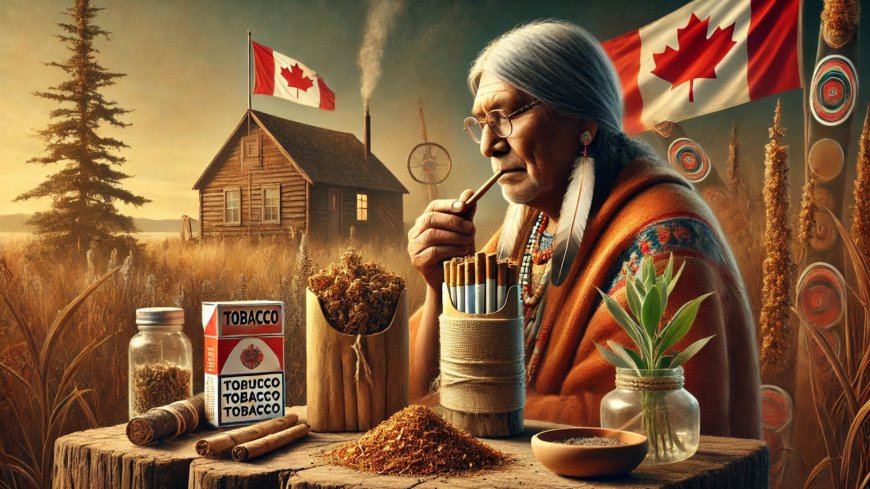The Role of Tobacco in Canadian Indigenous Communities

Tobacco holds a deep cultural, spiritual, and economic significance for Indigenous peoples in Canada. Unlike its commercial use in mainstream society, tobacco has been a sacred plant in Indigenous traditions for centuries, playing a vital role in ceremonies, social customs, and economic activities. Understanding the historical and contemporary role of tobacco in Indigenous communities provides insight into its enduring importance.
Tobacco as a Sacred Medicine
For many Indigenous nations, tobacco is considered one of the four sacred medicines, alongside sage, cedar, and sweetgrass. It is used in spiritual practices, including prayers, offerings, and purification ceremonies. The smoke from burning tobacco is believed to carry messages to the Creator, making it a powerful tool for communication with the spirit world.
Tobacco is also offered as a sign of respect and gratitude. Elders, knowledge keepers, and spiritual leaders may receive tobacco when being asked to share their wisdom or conduct a ceremony. This tradition reflects a deep respect for cultural protocols and the teachings passed down through generations.
Ceremonial and Social Uses of Tobacco
In Indigenous communities, tobacco is often used in:
Smudging ceremonies
The smoke is used to cleanse individuals, objects, and spaces.
Offerings
Tobacco is left in nature to show gratitude for blessings received.
Healing practices
Some traditional healers incorporate tobacco into their medicinal practices.
Gatherings and agreements
Tobacco is sometimes exchanged in agreements, symbolizing trust and respect.
These customs highlight the non-commercial use of tobacco, emphasizing its role in spiritual and social life rather than mere consumption.
The Economic Role of Tobacco in Indigenous Communities
Beyond its ceremonial role, tobacco also plays a significant economic function in many Indigenous communities. Indigenous-owned businesses manufacture and sell tobacco products, contributing to local economies and employment. These businesses often operate on First Nations reserves, where federal and provincial taxes may not apply, allowing them to offer competitive pricing. Many consumers look to buy native smokes online as a convenient way to access these products.
The ability to sell tobacco tax-free has become a vital economic tool for many First Nations, supporting infrastructure, education, healthcare, and community development projects. However, Indigenous tobacco businesses also face regulatory challenges as governments attempt to balance economic autonomy with national tax policies.
Challenges and Controversies
The commercial sale of tobacco by Indigenous businesses is sometimes met with regulatory scrutiny. While Indigenous communities assert their sovereignty over the tobacco trade, governments seek to regulate sales to ensure compliance with national taxation and health policies. This has led to ongoing legal and political debates about Indigenous rights, taxation, and economic independence.
Additionally, concerns exist regarding the health effects of tobacco consumption. While ceremonial tobacco use differs significantly from commercial smoking, Indigenous populations experience higher rates of smoking-related illnesses. Many communities are working to balance the cultural importance of tobacco with health initiatives aimed at reducing harmful smoking habits.
The Future of Tobacco in Indigenous Communities
The role of tobacco in Indigenous communities continues to evolve. Many First Nations are working to protect traditional tobacco practices while also leveraging economic opportunities in the industry. Some communities promote the use of traditional, additive-free tobacco rather than commercial cigarettes, advocating for a return to sacred tobacco practices rather than recreational use.
Efforts are also being made to educate Indigenous youth about the distinction between ceremonial and recreational tobacco use. Health programs emphasize the importance of respecting traditional uses while making informed choices about smoking and health.
Conclusion
Tobacco remains a powerful symbol of spirituality, culture, and economic resilience in Canadian Indigenous communities. Its sacred role in ceremonies and social customs continues to be honoured, while its economic contributions help sustain many First Nations businesses and communities. As Indigenous-led initiatives grow, the balance between tradition, health, and economic independence will shape the future role of tobacco in Indigenous societies across Canada.
What's Your Reaction?





























